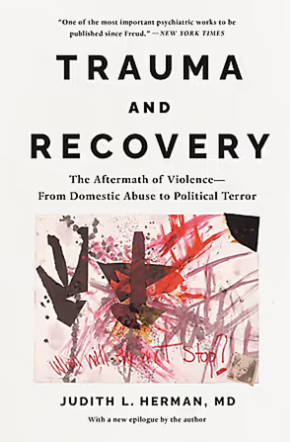Recommended reading
Trauma and Recovery
By Judith Herman
Judith Herman’s 1992 book Trauma and Recovery is a landmark in trauma studies. Herman, a leading psychiatrist and trauma expert, showed how domestic violence, child abuse, and captivity create similar psychological wounds to combat trauma thus validating experiences that had long been ignored or minimised and changing how we understand and treat psychological trauma.
Understanding Complex Trauma
Herman introduced the concept of “Complex PTSD”—trauma from prolonged, repeated abuse rather than a single event. She showed how this affects identity, relationships, and sense of self in distinct ways. This framework has helped survivors understand their experiences and enabled clinicians to provide better care.
The Three Stages of Recovery
Herman’s recovery model follows a natural progression: establishing safety, remembrance and mourning, and reconnection with life. This approach has become fundamental to trauma treatment worldwide.
A Message of Hope
Herman’s work emphasises that recovery happens in community, not isolation, and that healing is possible. Her legacy has empowered clinicians, advocates, and survivors to recognise that trauma can be overcome—it is not a life sentence, and that post-traumatic growth can occur.
The Body Keeps the Score
By Bessel van der Kolk
The Body Keeps the Score is a recommended read for those seeking to understand how trauma affects not just the mind, but the entire body. It explains how traumatic experiences become “stuck” in the body - affecting our nervous system, emotions, and even our physical health. The book makes affective neuroscience accessible and helps readers understand why trauma survivors may experience chronic pain, panic, or disconnection from their bodies.
The book explores various treatment approaches beyond traditional talk therapy, including EMDR, yoga, neurofeedback, and theatre and discusses how healing trauma often requires addressing the body’s responses, not just processing memories cognitively.
The underlying message is hopeful: the brain and body have remarkable capacity for healing. Van der Kolk presents trauma recovery as possible through various pathways, validating that different approaches work for different people.
It is a valuable read for survivors seeking to understand their experiences, family members wanting to support loved ones, and anyone interested in the mind-body connection. It’s comprehensive without being overwhelming and offers practical insight into the healing process. The Body Keeps the Score has helped millions of readers understand that trauma’s effects are real, physical, and - most importantly - treatable.
What Happened to You? Conversations on Trauma, Resilience, and Healing
By Bruce D. Perry, MD, PhD and Oprah Winfrey
This book offers a compassionate introduction to trauma and its effects on the brain and body. While less detailed than Bessel van der Kolk’s The Body Keeps the Score, it provides a concise and readable summary of current understanding in affective neurobiology and the lasting impact of traumatic experiences.
Presented as a conversation between Dr. Bruce Perry, a child psychiatrist specialising in childhood trauma, and Oprah Winfrey, the book weaves together scientific knowledge with personal stories and clinical examples. This conversational format makes neuroscience approachable without sacrificing important insights.
The central message encourages a shift in perspective: from asking “What’s wrong with you?” to “What happened to you?” This reframing invites curiosity and compassion rather than judgment, both in how we understand ourselves and how we relate to others. The authors explore how this lens can transform personal relationships and inform more humane approaches at a societal level.
What Happened to You? is an excellent starting point for anyone seeking to understand trauma’s effects in a format that balances scientific grounding with human storytelling. It is also available as an audiobook, which was our preferred medium for its conversational style.
Yoga and Meditation People and Resources
Tara Brach
Tara Brach, PhD is a clinical psychologist and meditation teacher who blends Western psychology with mindfulness practices in a warm, accessible approach. Research shows that mindfulness-based interventions can effectively reduce anxiety and depression, manage stress, and improve overall psychological well-being.*
Dr. Brach’s website (www.tarabrach.com) offers free weekly meditation podcasts, guided meditations, and teachings on mindfulness and self-compassion—making evidence-based practices accessible to anyone seeking support for their mental health.
References:
Khoury, B., et al. (2013). “Mindfulness-based therapy: A comprehensive meta-analysis.” Clinical Psychology Review, 33(6), 763-771.
Goyal, M., et al. (2014). “Meditation programs for psychological stress and well-being.” JAMA Internal Medicine, 174(3), 357-368.
Hofmann, S. G., et al. (2010). “The effect of mindfulness-based therapy on anxiety and depression.” Journal of Consulting and Clinical Psychology, 78(2), 169-183.
Yoga for Mental Health
Sandy King
Research shows that yoga may have significant positive effects on mental health, including reducing symptoms of anxiety and depression, lowering stress levels, and improving mood and emotional regulation. The combination of physical postures, breathing exercises, and mindfulness makes yoga a valuable and accessible tool for psychological well-being.
There are a number of free and paid yoga classes available online. Joining a class in your community is also a good way to connect with others in practice.
We recommend Sandy King’s Daily Movement Challenge as an approachable way to start or maintain a yoga practice.
Her free daily movement course (www.sandyking.com.au/daily-movement-course/) is designed for people of all fitness levels.
References
Cramer, H., et al. (2013). “Yoga for depression: A systematic review and meta-analysis.” Depression and Anxiety, 30(11), 1068-1083.
Hofmann, S. G., et al. (2016). “The effect of yoga on anxiety: A meta-analysis of randomized controlled trials.” Psychosomatic Medicine, 78(6), 658-666.
van der Kolk, B. A., et al. (2014). “Yoga as an adjunctive treatment for posttraumatic stress disorder.” Journal of Clinical Psychiatry, 75(6), e559-e565.



